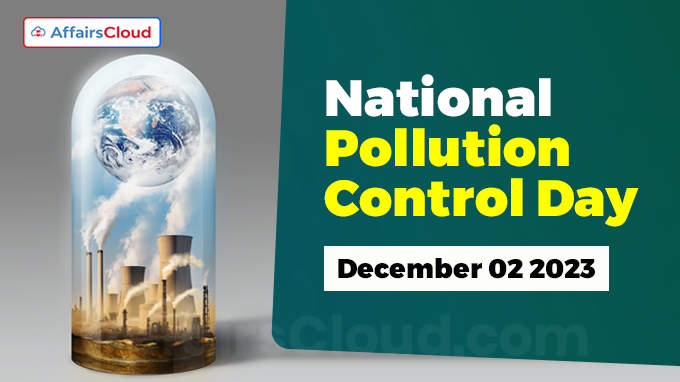 National Pollution Control Day or National Pollution Prevention Day is annually observed across India on 2 December in the memory of those who lost their lives in the disastrous 1984 Bhopal Gas Tragedy.
National Pollution Control Day or National Pollution Prevention Day is annually observed across India on 2 December in the memory of those who lost their lives in the disastrous 1984 Bhopal Gas Tragedy.
- The Day also aims to raise awareness of the management and control of industrial hazards and avoid pollution caused by industrial processes or human negligence.
2 December 2023 marks the 39th Anniversary of the Bhopal Gas Tragedy.
Bhopal Gas Tragedy:
i.Bhopal Gas Tragedy was India’s first major industrial disaster that took place on the intervening night of December 2 and 3, 1984, in Bhopal, Madhya Pradesh(MP).
ii.Almost 45 tonnes of the hazardous gas – Methyl Isocyanate (MIC) as well as several other poisonous gases leaked from a pesticide plant, Union Carbide (India) Ltd. (UCIL).
- UCIL was a chemical plant owned by the Indian unit of (a subsidiary of) the Union Carbide Corporation (UCC), an American chemical company.
Note: Apart from killing thousands of people in a short period, it led to disease and other long-term problems for many who inhaled the gas.
Aftermath of Bhopal Tragedy by Indian Government:
For the 1st time, the Bhopal Tragedy indicated a need for enforceable international standards for environmental safety, preventative strategies to avoid similar accidents.
ii.Major rules which were passed in India after the Bhopal disaster to ensure safety and to control disaster are,
- Bhopal Gas Leak Disaster Act, 1985
- The Environment (Protection) Act (1986)
- Criminal liability provisions of the Environment Protection Act, (1986)
- Factories Act, 1987
- Public Liability Insurance Act, 1991
- Disaster Management Act, 2005.
Note: Every year, around 7 million people die in India due to air pollution, with indoor air pollution killing 4 million. 9 out of 10 people on the planet do not have access to clean air.
Central Pollution Control Board
It is a statutory organisation, constituted in September 1974 under the Water (Prevention and Control of Pollution) Act, 1974.
Functions of CPCB at National level:
i.Advise the Central Government on any matter concerning prevention and control of water and air pollution and improvement of the quality of air.
ii.Provide technical assistance and guidance to the State Boards, carry out and sponsor investigation and research relating to problems of water and air pollution, and for their prevention, control or abatement;
iii.Prepare manuals, codes and guidelines relating to treatment and disposal of sewage and trade effluents as well as for stack gas cleaning devices, stacks and ducts;
About Central Pollution Control Board (CPCB):
CPCB functions under the Ministry of Environment, Forest and Climate Change(MoEF&CC).
Chairman– Tanmay Kumar
Headquarters– New Delhi, Delhi




